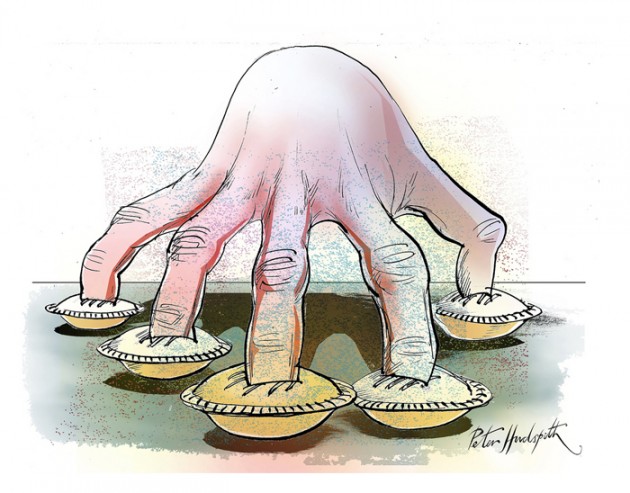A FINGER IN EVERY PIE
During a time of personal or national crisis, many people seek out a place of worship not only for comfort and peace but also to be uplifted with inspiring messages of hope and trust. Whether it’s a temple, a mosque or a church, many of us find inner strength from our faith and rely on our clergy for spiritual counsel and guidance. We believe they are both a servant and a messenger of a divine power whose intentions and motivations are purely charitable.
Our faith in clergy should be examined closely, however, when we find out that our church (or other place of worship) owns a lot of real estate and is a major stockholder in several corporations, including large financial institutions. Such is the case for the majority of people residing in Cyprus, where 70% of the population belongs to the Greek Orthodox Church. Since the days of the Ottoman Empire (going back to the late 1500’s), the Church of Cyprus has always been a powerful force in the country, exercising both political and economic influence. In fact, when Cyprus gained its independence from British colonial rule in 1960, the first elected President was also the Head of the Church, Archbishop Makarios III. Today, the Church owns MAJORITY of the property on the island, including hotels, valued in the billions. They are also the largest shareholder of KEO, a beverage company that produces wine, beer and bottled water. Most importantly, however, is the fact that they are a major shareholder of the two largest banks in Cyprus, The Bank of Cyprus and Hellenic Bank.
When Cyprus went through their financial crisis earlier this year, the first one to raise their hand to offer bail-out assistance was the Church’s Archbishop Chrysostomos II. Known as a skilled and shrewd businessman, he was willing to mortgage all of the Church’s land in order to support the country and its people and “help them stand on their own two feet”. Although many locals saw him as a savior, others were very uneasy about this offer to help, particularly when the Archbishop began to criticize Belgium’s poor crisis management skills and started calling for Cyprus’ complete withdrawal from the European Union. The uneasiness and concern grew even more when Chrysostomos announced his plans to travel to Moscow to visit many major Russian investors and “help” influence them to keep their money in Cypriot banks. It is this very close relationship with Russia that has earned Chrysostomos the title of the “Second Russian Ambassador” and resulted in many critics fearing that Cyprus will one day fall into Russian hands.
Although a bail-out agreement was worked out with assistance coming from the IMF and the EU instead, there is still a heated debate over whether the Church of Cyprus should have “a finger in every pie”. What does it mean for the people when Church and State are NOT separate? This is especially important to think about when not every citizen of the country is a member of the Church. In the case of Cyprus, approximately 20% of the population is Turkish Sunni Muslim, while the remaining 10% have another affiliation or none at all. So it’s probably reasonable to assume that at least a third of Cypriot citizens do not want the Church of Cyprus to be involved with their government and wield so much power and influence.
Every country has struggled with the concept of separating church and state at one point in their history, and most have not been successful at keeping them as independent organizations. No matter how benevolent or charitable a church may be, there will understandably always be a large percentage of society that will be alarmed and suspicious when it grows too powerful. Just like many of us are concerned now that our own government has grown too strong and is too involved in our lives, it would be even more worrisome if our Church also had a say so. But what is most dangerous about a country that is controlled by its major religion is the inevitable certainty that those who do not prescribe to that same faith (or any faith at all) will one day be discriminated against and face persecution of some kind. It is so important today that we never forget that religion has been the root cause of many of our wars.
Copyright © 2013 (Michelle Parsons, Getting Back on Your Path). All Rights Reserved.

